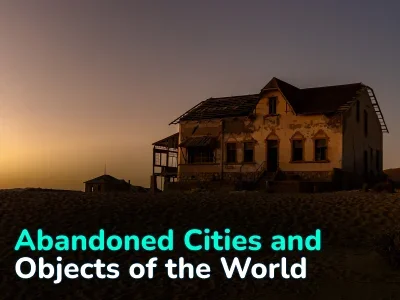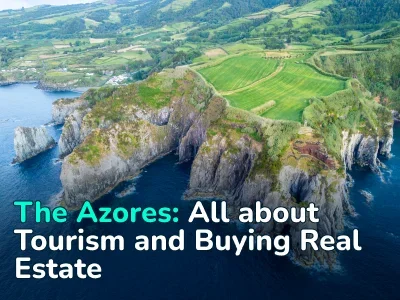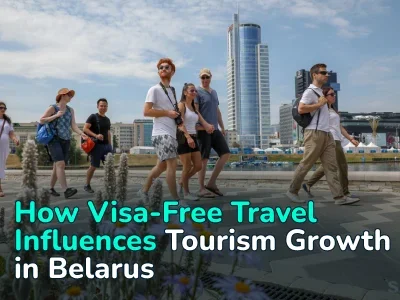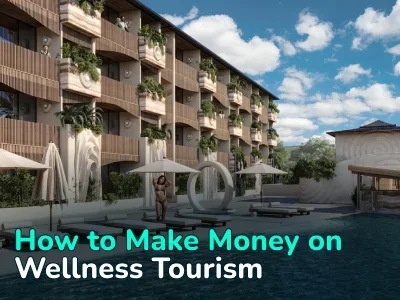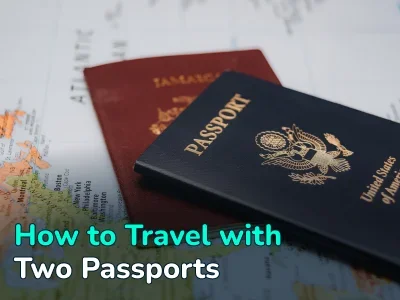
Digital Nomad Visa in European Countries
Almost 20 countries in Europe already issue visas for digital nomads, and the list is constantly growing. Which countries are these, and how to become a digital nomad in each of these destinations? We will tell you in our detailed guide.
You can learn the most important things about current digital nomad visas around the world by reading our material. There, we have collected all the most important information on nomad visas on every continent.
In this guide, we will focus on European countries and tell in detail which of them have already issued such a document, for how long you can get it, and what criteria you need to meet.
Albania
Albania has a visa for digital nomads — (visa D for digital mobile workers).
Who can get it: foreigners working remotely on the basis of a contract with a foreign employer or client.
Features: it is possible to take a family; the visa must be converted to an Albanian residence permit upon arrival.
Visa validity: 1 year; can be extended for 2 years and then for 5 years.
Requirements:
- Employment contract with a company or service contract with a contractor registered outside the territory of Albania.
- Diplomas, certificates, and other documents confirming your qualifications.
- Monthly earnings of €305 per month and having financial resources in an Albanian bank of 408,000 lek (€3900).
- Certificate of no criminal record.
- Housing contract (minimum of one year).
- Health insurance (must be valid for at least 1 year).
The visa application is submitted online. It takes 15 to 30 working days to be processed.
The cost of a D visa is 80 euros.
Life in the country: rent of a one-bedroom apartment: €280-400; utilities: €105; monthly pass: €15; lunch in an inexpensive café: €8.
Andorra
In Andorra, a visa for digital nomads — Residència per a nòmada digital — appeared in December 2022. In essence, it is a residence permit based on remote work.
Who can get it: remote specialists who work on the basis of a contract with a foreign employer; freelancers providing services to foreign customers.
Features: you can take your family; the number of nomad visas is limited to a quota of no more than 50 per year.
Visa validity period: initially 2 years. First extension — for 2 years; second extension — for 3 years; subsequent extensions — for 10 years.
Requirements:
- A valid passport and visa application.
- Monthly income of at least €3858 (300% of the minimum wage in Andorra for 2023).
- Criminal record certificates from all countries of residence and citizenship.
- Actual photo.
- Positive decision from the Ministry of Economy on the status of digital nomad.
- Proof of homeownership/rental in Andorra.
- Labor agreements/contracts with foreign employers/customers.
- Marital Status Documents.
- Willingness to reside in the country for a minimum of 90 days per year.
- Health insurance.
All documents must be translated, legalized/apostilled.
A visa can be issued locally.
The application fee to the migration office will cost approximately €191.
Life in the country: rent of a one-bedroom apartment: €800-950; utilities: €100; monthly pass: €35; lunch in an inexpensive café: €13.
Hungary
Hungary has a White Card residence permit for digital nomads.
Peculiarities: family members will not automatically receive the same residence permit; you cannot apply for other types of residence permits while the White Card is valid; the White Card is revoked if you receive a share in a Hungarian company.
Validity period: 1 year, renewable once for another year.
Requirements:
- Be a citizen of a country outside the EU, the European Economic Area, or the Schengen Area (so-called third country).
- Not to have a share in a Hungarian company and not to seek employment in Hungary.
- Have a proven employment relationship in a country other than Hungary and perform work remotely using digital technology, OR own a stake in a profitable company outside of Hungary and manage it remotely.
- Income of at least 3000 euros per month for the last 6 months.
- Availability of housing in Hungary (rental/ownership agreement).
- Health insurance or sufficient funds to cover expenses.
- Possession of a valid passport.
You can apply:
- to the Hungarian Embassy/Consulate in the country of residence;
- for visa-free countries — through the Enter Hungary online portal.
The application fee will be $125, and $77 if applying online. The visa is issued within 21 days. Once approved, you can get an entry visa for 30 days to enter Hungary. After entering Hungary, you need to go to the local immigration office and get a White Card.
Life in the country: rent of a one-bedroom apartment: €330-420; utilities: €135; monthly pass: €23; lunch in an inexpensive café: €9.
Germany
Germany issues a residence permit for the self-employed (freelancers) called “Aufenthaltserlaubnis für Selbständige Tätigkeit.”
Validity period: 6 months to 3 years (can be extended afterwards).
Requirements:
- Confirmation of self-employment.
- Stable income.
- Health insurance.
- Address in Germany.
- Availability of German clients, namely proof of intent to cooperate from at least two potential clients/employers in the form of letters or fee contracts.
- Adequate pension plan (if the applicant is 45 or older); to put this in perspective, at age 67, you must have either a monthly pension of at least €1,503.34 for at least 12 years or assets worth at least €216,481.
You can apply for a visa by making an appointment at the German Embassy. Once you have received your visa and arrived in the country, you will need to apply for a residence permit and submit the required documents. This service will cost you approximately 100 euros (for Turkish citizens under 24 years of age — 22.80 euros; after 24 years of age — 37 euros).
The average application processing time is about 5–6 weeks. It is advisable to register for an extension 4–6 weeks before the expiration of the existing residence permit.
Life in the country: rent of a one-bedroom apartment: €700-950; utilities: €300; monthly pass: €50; lunch in an inexpensive café: €13.
Greece
The so-called Greece Digital Nomad Visa works in Greece.
Special features: if you will be in the country for 180 days or more in a calendar year, you may be required to establish tax residency in Greece (including obtaining a Greek tax number) and pay local taxes.
Valid for one year, and then a residency permit can be issued for up to 2 years, with an option to extend for another 2 years.
Requirements:
- Monthly earnings of at least 3500 euros after taxes (if traveling with a spouse, you must add another 20%, and for each child, 15%).
- You need to work remotely as a salaried or self-employed person with customers outside the country.
Important: during this period, you will not have the right to work for a Greek company on a permanent basis or as a freelancer.
The visa application must be submitted to the Greek Consulate in your country of primary residence under the fast-track procedure. The request can be sent by e-mail or registered letter. The consulate must respond within 10 days. The visa application fee is 75 euros.
Life in the country: rent of a one-bedroom apartment: €400–500; utilities: €216; monthly pass: €30; lunch in an inexpensive café: €15.
Iceland
Iceland issues a long-term visa for remote workers for 90 to 180 days.
Special features: the holder of such a visa will not be issued an Icelandic identification number; spouses, partners, and children (under 18 years of age) of a digital nomad can also obtain a long-term visa as dependents of the person working remotely.
Validity: up to 180 days if applying from your country of residence before arriving in Iceland, or up to 90 days if applying after entering the Schengen area.
Requirements:
- Being from a non-EEA/EFTA country.
- No need for a visa to enter the Schengen area.
- No long-term visa to Iceland in the last 12 months.
- Working remotely for a foreign company (excluding Icelandic employers) or as a self-employed person.
- Monthly income of at least ISK 1,000,000 (about €6,300,000) or ISK 1,300,000 (about €8,200) if applying for your partner/spouse as well.
You need to apply for a visa at the Icelandic immigration office; you can do it by mail (having previously paid for this service by bank transfer — the fee is 12,200 ISK (about 77 euros). Upon arrival in the country, after the application is approved, you should contact the immigration office and get your visa. You can fill in the application form here.
Life in the country: rent of a “single room”: €1400–1600; utilities: €97; monthly pass: €62; lunch in an inexpensive café: €20.
Spain
The digital nomad visa in Spain has already come into force as of April 2023. This visa for remote workers was introduced as part of the Startup Law.
Features: family members (spouse/partner, minor children, dependents) can also get a visa, but this service will cost more.
Visa validity: 1 year. Then you can get a residence permit for 2 years, or there is an option to get a residence permit immediately inside the country — for 3 years with an indefinite working contract (or for a specified period of the contract). Then the residence permit can be extended for another 2 years.
Requirements:
- Must work remotely for companies outside of Spain or be self-employed, provided that working for a Spanish company does not exceed 20% of their total professional activity; proof of financial means (minimum 200% of the minimum wage in Spain — in 2025, this amount was increased by €100 to €2762 per month). For a couple, the minimum income must be €3797 per couple per month. An additional €1035 per month is required for each non-working adult and €346 for each child.
- Relevant education or work experience for a minimum of 3 years.
- For family members, documents proving kinship.
You can apply directly for a visa at Spanish embassies; in the case of a residence permit, it can be applied for within Spain itself, automatically skipping the visa stage.
Application processing time: 10 days, longer if additional documents are requested.
Visa cost: paid according to the consular fees; currently, it is about 630 euros for the main applicant and 525 euros for each family member. However, the amount may change due to exchange rate fluctuations.
Life in the country: rent of a one-bedroom apartment: €700–930; utilities: €127; monthly pass: €32; lunch in an inexpensive café: €12.

Italy
After 2 years of discussions, Italy signed a decree to launch a visa for digital nomads, which will be identical to the residence permit. This visa can be obtained by foreigners from non-EU countries who perform highly skilled remote work using advanced technologies.
Special features: the visa opens the way to obtaining a residence permit after 5 years of residence on this visa; family members can come on family reunification (spouse, children under 18, parents — under certain conditions).
Visa validity: 1 year and can be extended if conditions are maintained (employment, income, insurance, housing).
Requirements:
- Annual income of at least 28,000 euros.
- Health insurance valid in Italy.
- Confirmed permanent residence in Italy.
- Minimum of 6 months of remote work experience.
- Confirmation from the employer that the remote work has been completed.
- No criminal record.
The visa application is made after entering Italy at the local police station.
Life in the country: rent of a one-bedroom apartment: €600–800; utilities: €200, monthly pass: €35, lunch in an inexpensive café: €15.
Cyprus
The Cyprus digital nomad visa is valid from 2021. It is also a temporary residence permit. Initially, a quota of 100 visas was set, but this was increased to 500 visas in March 2022.
Features:
- The family members of a digital nomad (spouse/civil partner, and minor children) can also obtain a temporary residence permit for the same period of time, but without the right to work or engage in economic activity in Cyprus.
- If a digital nomad resides in Cyprus for more than 183 days during a tax year and is not a tax resident of another country, he is considered a tax resident of Cyprus.
Visa validity: 1 year (can be extended for a maximum of 2 more years). Applications for extensions must be submitted at least one month before the expiration date of the current residence permit.
Requirements:
- Be a citizen of a non-EU or EEA country.
- Being an employee of a company registered outside Cyprus or self-employed and providing services to clients abroad.
- Availability of insurance.
- Income from €3500 per month after taxes and fees;
- No criminal record.
- Reserved accommodations.
You can apply for a visa within 3 months of arrival at the office of the Civil Registry and Migration Department in Nicosia. Officially translated and certified documents are required.
The application will be considered for 5–7 weeks. In cases of approval, the applicant will receive a letter with instructions on how to obtain a residence permit; in cases of refusal, a letter explaining the reasons.
The fee for obtaining or extending a residence permit is 70 euros. For initial registration, 70 euros are also charged for registration in the Foreigners' Register.
Life in the country: rent of a one-bedroom apartment: €700–900; utilities: €185; monthly pass: €45; lunch in an inexpensive café: €15.
Latvia
Latvia's digital nomad visa was introduced in 2022, although it has been discussed since 2020.
Peculiarities: holders of this visa are not allowed to work directly in Latvia; family members cannot apply for this visa together with the applicant.
Visa validity: 1 year.
Requirements:
- Being employed by an employer from an OECD member country* or a self-employed person registered in one of these countries.
- Have the ability to perform work remotely while in Latvia.
- If an employee — provide a certificate from the employer of at least 6 months of employment and an income of at least €3433 per month.
- If self-employed, prove an income of at least €3433 per month for the last six months.
- Health insurance valid in Latvia and Schengen with coverage of at least 42,600 euros.
- Proof of residence in Latvia.
The visa application is submitted to the Latvian Citizenship and Migration Board.
Visa cost: only the state fee is payable (within 10 euros).
Life in the country: rent of a one-bedroom apartment: €300-450, utilities: €300, monthly pass: €30, lunch in an inexpensive café: €10.
* OECD — Organization for Economic Cooperation and Development. It consists of 38 countries: Austria, Australia, Belgium, Canada, Chile, Colombia, Costa Rica, the Czech Republic, Denmark, Estonia, Finland, France, Germany, Greece, Hungary, Iceland, Ireland, Israel, Italy, Japan, Korea, Latvia, Lithuania, Luxembourg, Mexico, the Netherlands, New Zealand, Norway, Poland, Portugal, Slovakia, Slovenia, Spain, Sweden, Switzerland, Turkey, the UK, and the USA.
Malta
In Malta, the program for nomads is called Nomad Residence Permit.
Features:
- You can be from both EU and non-EU countries (currently, the program is not available for Russians and Belarusians).
- You can apply for the program with your family members.
- There is no income tax to pay as a digital nomad (you will only have to pay taxes if you are self-employed and offer services to Maltese companies).
Visa validity: one year, with the possibility of extension up to 4 years. You will also be able to travel freely within the Schengen area during this time.
When applying for an extension, you must provide a bank statement from Malta confirming a stay of at least 5 months in the previous 12 months.
Requirements:
- As of April 1, a minimum annual income of €42,000 (previously €32,400) must be proven.
- The job/business must be outside Malta.
- A valid passport, a rental/purchase agreement for accommodation in Malta for the duration of the permit, and health insurance are required.
You can apply for a visa online by email (address: nomad.residencymalta@gov.mt). You can fill in the application form here. Once approved, you will need to pay a non-refundable fee of €300. You will then be issued an entry visa (if required) and, upon arrival in Malta, a Resident Card (€27.50 on receipt).
It takes about 60 business days to process the application after the fee is paid.
Life in the country: rent of a one-bedroom apartment: €780-930, utilities: €94; monthly pass: €26; lunch in an inexpensive café: €15.
Netherlands
The Netherlands has a residence permit for self-employed workers in priority sectors of the economy.
Features: possible to move in with family.
Validity period: maximum 2 years.
Requirements:
- Registration in the Commercial Register of the Dutch Chamber of Commerce (Kamer van Koophandel).
- Availability of all necessary permits/licenses to work.
- Evidence that the activity is of significant interest to the economy (assessed using a scoring system).
- For freelancers, having one or more orders/contracts in the Netherlands.
- For personal health care workers, registration in the appropriate BIG-register.
- Adequate income (at least 1564 euros per month).
- Existence of a business plan.
The visa application is issued at the Dutch embassy/consulate abroad.
Application processing time: up to 90 days, may be extended up to 6 months.
Cost: it will cost 380 euros to apply.
Life in the country: rent of a one-room apartment: €1100–1350; utilities: €225; monthly pass: €80; lunch in an inexpensive café: €15.
Norway
Norway has a visa for self-employed workers (see “Self-employed persons with a company abroad”).
Special features: does not entitle to permanent residence; authorized residence for spouse/partner, and children when contracted for more than 6 months.
Visa validity: maximum 6 years in one period. After 6 years, you must leave Norway for 2 years before submitting a new application.
Requirements:
- Have a contract to work with a registered Norwegian company.
- Be registered as a sole proprietor abroad (not an LLC).
- Relevant qualifications (minimum 3 years of vocational education, university degree, or 6+ years of work experience).
- The level of pay is not lower than the standards for the occupation in Norway: if the job requires a bachelor's degree, the minimum annual salary before tax must be at least NOK 448,900 (approximately €38,978); if a master's degree, at least NOK 480,900 (approximately €41,756). For jobs that do not require higher education, the salary must correspond to the level set by the collective agreements in the industry, if there are any.
The visa application is issued at a Norwegian embassy or visa application center.
Application processing time: up to 2 months after submission of documents.
Visa cost: 6300 Norwegian kroner (about 550 euros) + possible visa center fees.
Life in the country: rent of a one-bedroom apartment: €800–1150; utilities: €190; monthly pass: €70; lunch in an inexpensive café: €17.
Portugal
Portugal's digital nomad visa was launched on October 30, 2022 — it is officially positioned as a “resident visa for professional activities provided remotely outside the national territory.”
Features:
- The new visa is an alternative to the existing “D7” visa, which is designed for pensioners and those on “passive income.”
- All those who work remotely as an employee or independent professional and are coming to Portugal NOT from an EU or European Economic Area country can apply for a visa.
- The principal applicant may apply with his/her family members as accompanying persons. Alternatively, once the principal applicant has obtained a residence permit in Portugal, his/her family members may subsequently apply for family reunification separately.
Visa validity period: since it is a residency, the minimum period is 1 year, with the possibility of a subsequent extension.
Requirements:
- For employees, provide an employment contract or a declaration from the employer confirming the employment relationship.
- For independent professionals: provide the company's memorandum of association, a service contract, or a document confirming the provision of services to one or more clients.
- Proof of an average monthly income for the last 3 months of at least the equivalent of 4 minimum monthly salaries in Portugal (in 2024, it is 820 euros before taxes).
- A document confirming tax residency.
- Full set of standard visa documents (application form, photo, passport, insurance, etc.).
You can apply for a visa at the Portuguese consulate in your home country or at the Portuguese immigration agency, Serviço de Estrangeiros e Fronteiras (SEF).
Life in the country: rent of a one-bedroom apartment: €720-940; utilities: €111; monthly pass: €40; lunch in an inexpensive café: €10.
Romania
Romania introduced its visa for digital nomads by amendments to Law No. 22 of January 14, 2022.
Visa validity period: 6 months or 1 year. As specified in the official document, the first extension of the temporary residence permit for this category is granted for 6 months.
Requirements:
- Have an income of at least 3 average Romanian salaries (about 3700 euros) in the last 6 months from remote work for a company registered outside Romania or from operating your own company abroad.
- Provide an employment contract with a foreign company or proof of ownership/management of a foreign company for a minimum of 3 years.
- Provide documents confirming the payment of taxes abroad.
- Have health insurance of at least 30,000 euros.
- Provide a certificate of no criminal record.
- Confirm funds for lodging.
You can apply for a visa at a diplomatic mission or at a Romanian consulate (in person or by e-mail). Fill in the application form here. The decision on your application will be sent to you in the form of a notification to your e-mail.
Life in the country: rent of a one-bedroom apartment: €300–410; utilities: €133; monthly pass: €18; lunch in an inexpensive café: €8.
Croatia
Croatia launched a residence permit program for digital nomads on January 1st, 2021.
Who can get it: freelancers and remote professionals working for a foreign employer or for their company outside Croatia.
Special features: no income tax for the first year; you can bring your family: spouses, children under 18, elderly parents, or partners when living together for 3 years or more.
Visa validity: up to 1 year; you can apply for a new visa only six months after the end of the previous one.
Requirements:
- A monthly income of at least EUR 2,539.31 (or EUR 30,471.72 in a bank account for a year);
- completed application;
- proof that you're not working for Croatia;
- passport copy;
- a criminal record;
- health insurance;
- address in Croatia (can be temporary);
- for spouse — marriage certificate; for children — birth certificate.
Applying: 1) at the nearest Croatian consulate in your home country; 2) at a police station in Croatia itself; 3) online.
Cost: from 134 euros for visa and registration.
The processing of the application usually takes about a month. If you are approved, you can fly to Croatia, register with the police, and, after 3 weeks, pick up your biometric residence card.
Life in the country: rent of a one-bedroom apartment: €450–550, utilities: €175, monthly pass: €44, lunch in an inexpensive café: €10.
* Croatia joined the Schengen zone on January 1, 2023, allowing digital nomads to travel around Europe without a visa for 90 days.
Montenegro
Nomads who want to stay in Montenegro have two options: to apply for a national D visa or a residence permit for digital nomads. This follows according to the “Law on Foreigners” in this country.
Features:
- You can't work for local companies and clients.
- You don't have to pay income tax while you're in digital nomad status.
- The spouse and children of the principal applicant may go through the reunification process and also remain in the country.
Visa expiration date:
If it is a national visa D, then up to 180 days per year; if a residence permit is issued, up to 2 years, with the possibility to extend the document once again for 2 years. After these 4 years of stay in the country under the status of nomad, it will be necessary to leave for at least six months.
Requirements:
- Possibility of obtaining a D visa or visa-free entry to Montenegro.
- Proof that you work remotely for a company registered outside Montenegro (contract, certificate of employment).
- Minimum income of 1350 euros per month for the last year. For family reunification, add 310 euros to this amount for each family member.
- Availability of long-term housing in Montenegro.
- Health insurance for a minimum of one month.
- Certificate of no criminal record.
- Proof of payment of contributions to the pension fund and health care system at your place of employment.
The visa application can be submitted in person inside Montenegro at the police department of the internal affairs of a particular city.
Application processing time: no more than 40 days after submission.
Life in the country: rent of a one-bedroom apartment: €460-600, utilities: €112, monthly pass: €30, lunch in an inexpensive café: €9.
Czech Republic
Recently, the Czech Republic launched a digital nomad program. But as it turned out, not everyone can get a Czech digital nomad visa.
Validity period: for a maximum of 1 year for both employees of foreign companies and freelancers.
Requirements:
Citizenship of one of the following countries: Australia, Japan, Canada, the Republic of Korea, New Zealand, the United Kingdom, the United States, or Taiwan.
For employees of foreign companies:
- Work for a foreign company with at least 50 employees worldwide.
- The possibility to work remotely via telecommunication means must be stipulated in the employment contract or confirmed by a written statement of the employer.
- Have a relevant education (university or higher vocational education in science, engineering, technology, or math — STEM) or at least 3 years of IT experience.
- Prove an income of at least 1.5 times the average annual gross salary announced by the Czech Ministry of Labor and Social Affairs (about €30,264 per year or €2,522 per month).
For freelancers (self-employed):
- Register free enterprise (obtain a license) in the field of IT in the Czech Republic.
- Have relevant education or at least 3 years of IT experience.
- Prove an expected income of at least 1.5 times the average annual gross salary in the Czech Republic.
The visa application is submitted at the relevant Czech embassy/consulate abroad in the applicant's place of permanent residence.
Application processing timeframe: within 45 days of submitting a complete set of documents and requirements.
The cost of living in the country: rent of a one-room apartment: €580–750; utilities: €260; monthly pass: €20; lunch in an inexpensive café: €8.
There's a second option
The Czech Republic also has a long-term visa for entrepreneurs and the self-employed, which can be obtained by citizens of non-EU countries and those from outside Iceland, Liechtenstein, Norway, and Switzerland*.
Visa validity: up to one year, with the possibility of extension or change of status to a residence permit.
Requirements:
- Provide a trade license* or other document confirming the purpose of stay (sole proprietorship, extract from the register of companies, etc.).
- Confirm that you have the means to live in the country.
- Reservation of housing for up to 1 year.
- Certificate of no criminal record.
- Once you enter, you must take out health insurance.
Important: documents must be translated into Czech, foreign documents must be legalized.
You can apply for a freelancer visa at the Czech embassy in your country.
Processing time: usually 90–120 days.
*A trade license is a document that confirms your right to run your own business in the Czech Republic. The main conditions for obtaining it are that you must be 18 years of age and have no criminal record; sometimes proof of education and/or work experience is required.
*Recruitment of Belarusians and Russians for economic migration programs in the Czech Republic is currently suspended.
Estonia
The Digital Nomad Visa program is available in Estonia. The acceptance of applications for this visa opened on August 1, 2020.
Features:
- It is not a residence permit but only a right of temporary residence in Estonia.
- If your stay exceeds 183 days in 12 consecutive months, you will receive tax residency status and must pay local taxes.
- Family members (spouse/partner, minor children) can apply for companion visas.
- The visa does not provide advantages for obtaining a residence permit in the future.
- With this visa, it is also possible to work for an Estonian company, but the main purpose of staying in Estonia must remain the remote work specified in the application. That is, working for an Estonian company can be an additional but not the main activity during the stay on a digital nomad visa.
Visa validity period: up to one year, with the possibility to submit a new application for a further period of up to 6 months. Maximum continuous period of stay: 1.5 years.
Requirements:
- Citizenship of one of the countries not included in the restrictive list (this includes, among others, Russia and Belarus).
- One of the following statuses: employee of a foreign company, affiliate/shareholder of a foreign company, or freelancer providing services mainly to foreign clients.
- Proven legal income for the last 6 months should not be less than 4500 euros per month.
You can apply for a visa at the nearest Estonian embassy or at the Police and Border Guard Board (if you are already in the country). The fees will cost you €80–100.
The review process takes up to 30 days.
Life in the country: rent of a one-bedroom apartment: €450–600; utilities: €267; monthly pass: €30; lunch in an inexpensive café: €12.
It is worth mentioning that Estonia also offers “e-residency,” which allows remote workers to gain digital access to Estonia's e-services without providing residency. This will be useful if you want to set up a company in Estonia and manage it online. You will also have access to banking services and be able to declare taxes remotely in the country.
Author
I am responsible for editorial work. I write expert interviews and guides.

















